There is a thread that links each of Terry George’s films, and it comes directly from his life. “I’m talking about ordinary people struggling against oppression,” he tells Irish America. “That’s always been my kind of guiding light.”
Whether it’s the true-to-life tale of the late Gerry Conlon (the Belfast man who spent 15 years in an English prison having been wrongly accused) in In the Name of the Father, or the two bereaved mothers in Some Mother’s Son, or Hotel Rwanda (2004), about the struggle of Tutsi refugees against the Hutu militia, or, more recently, the tragic lovers fleeing the Armenian genocide in The Promise, the thread linking each of these films is unmistakable.
No wonder, really. The 66-year-old Irish filmmaker learned about oppression the hard way, growing up in a city long divided by allegiance and history.
“My father and mother came from the staunchly nationalist Markets area and the Short Strand in Belfast, and they aspired to get out of the ghetto, eventually moving to a lower middle-class Protestant neighborhood,” he tells Irish America.
“That was in the 1960s, when the North was starting to desegregate to some degree. And then when the Troubles broke, they were forced out of it.”
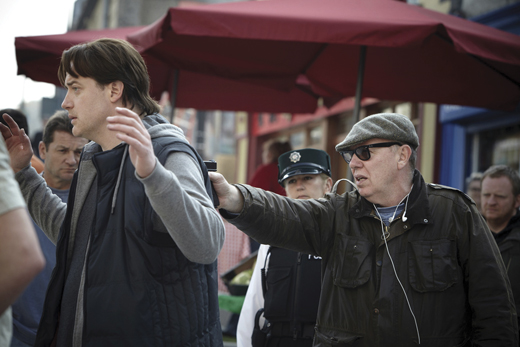
Not everyone may be aware of how massive that exodus was: up to 60,000 people were burned out of their homes in Belfast alone in what was then the biggest displacement of citizens in Europe since World War II. It completely re-segregated the map of Belfast.
Like a lot of young people at the time, George was himself swept up in the conflagration. In 1971, he was arrested with a group of fellow teenagers in a security swoop. For three days he was interrogated and beaten, until he finally confessed that he was in the I.R.A. to make it stop.
He was then imprisoned without trial for eight weeks, and word got around quickly. After he was named as an I.R.A. member (a charge he denies), his family were forced out of their home by angry Protestant extremists – who threatened to burn it down.
“We ended up in Twinbrook, which at that point was a new housing development. It had become a sort of de facto refugee camp when Catholics from all over Belfast were burned out of their homes.”
In 1975, George was arrested again. He was reportedly driving with armed militants when British soldiers stopped and arrested them, although George insists that he did not have a weapon. Soon after, he was sentenced to six years in prison.
“In 1975, I was sentenced to six years and I did three,” he says. He was sent to the Maze, which at the time also held Gerry Adams and Patsy O’Hara, the third of 10 men to die in the 1981 hunger strikes.
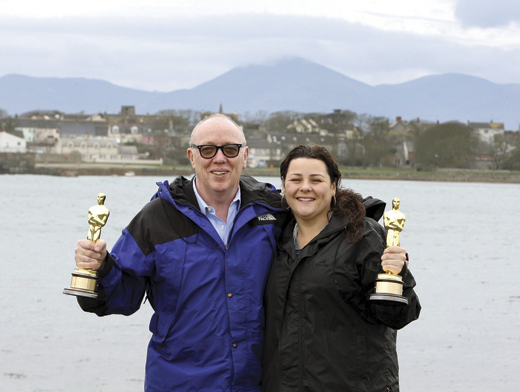
“Out of that experience came a lot of the writing for my debut play, The Tunnel. A lot of the films that (fellow Irish filmmaker) Jim Sheridan and I worked on together all draw from that period. So the Troubles not just shaped my life, my family’s life, but certainly shaped my artistic life.”
Exodus was really the only option on the menu for that talented generation of Irish actors and filmmakers in the ’70s and ’80s in Belfast, he admits. Think of Kenneth Branagh, Liam Neeson and Terry himself – all of them had to leave their home to make their mark in their chosen industries.
In 1981 he moved with his wife Rita and infant daughter Oorlagh to New York City, and it changed his life. There he did “what everybody else does,” construction, bartending, driving taxis, loading trucks. Then he got a job at New York magazine as a fact checker, through the help of two Irish-American writers. “I got that through Michael Daly and Pete Hamill, who sort of put a word in for me, and, you know, both of whom were seminal in starting off my writing career.”
At the time, George wrote a freelance music column for the Irish Voice, and he was the first to interview the Pogues for Rolling Stone when they came over to the U.S. for their debut tour. “I remember that as a funny interview because the fact checkers at the magazine couldn’t understand a word lead singer Shane MacGowan was saying on the tape.”
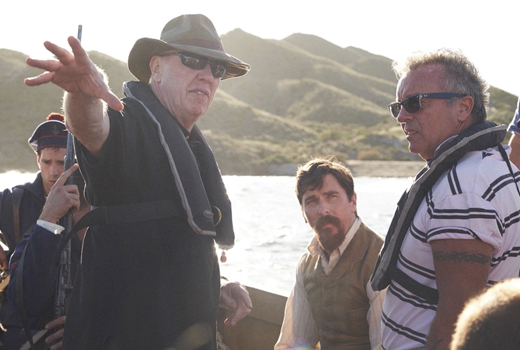
Coming to America was a liberation for George in terms of the career possibilities. “Even though we were undocumented, I felt more that I belonged in New York that I ever felt in Northern Ireland. I don’t know if it’s quite the same today, but back then you felt part of an Irish family. There was a community, and by that point a wave of Irish immigration was going on. So the possibilities were enormous compared to what they had just left behind.”
In 1985, George’s play The Tunnel, about his experiences in the Maze, opened at the Irish Arts Center, where Jim Sheridan was the artistic director. It caused a sensation and ran for six months.
After that he wrote about the hunger strikers, an event that had enraged nationalist opinion across the spectrum in a way rarely seen. George says he did not agree with the tactic, but his exploration resulted in the screenplay Some Mother’s Son. The film focuses on the mothers of two of the strikers (played by Fionnula Flanagan and Helen Mirren) who are caught up their sons’ struggle.
The script languished unproduced, but soon after Gabriel Byrne commissioned George to write In the Name of the Father, based on the true story of four people falsely convicted of the 1974 Guildford pub bombings, which killed four off-duty British soldiers and a civilian. The film received seven Oscar nominations. It’s success then allowed George and Sheridan to produce Some Mother’s Son (1996) in Ireland, with a budget of $8 million.
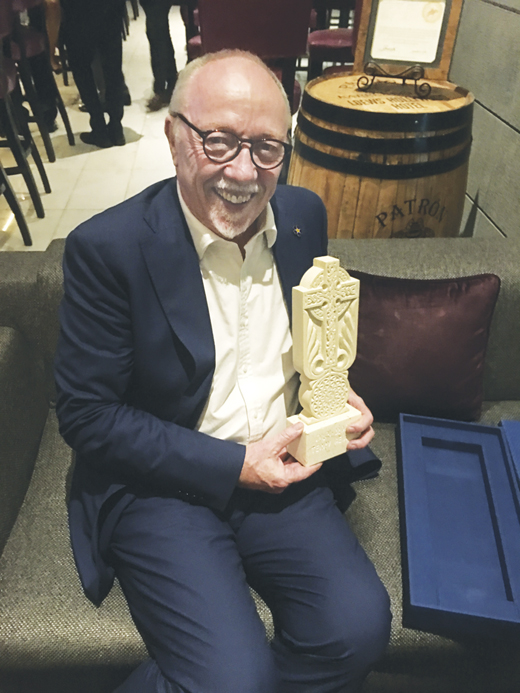
George is keenly aware of the power of the medium to influence people. His film Hotel Rwanda (2004), about the Rwandan genocide in 1994, was nominated for multiple awards, including Academy Award nominations for Best Actor, Best Supporting Actress, and Best Original Screenplay. He says Hotel Rwanda “helped change the Americans’ perspective on that whole situation.” And, “In The Name of The Father had an impact on Bill Clinton and others at a time when the peace process was just clicking off, so movies do have a way of changing the world. I strongly believe that.”
The success of George’s projects also left some others not so enamored. “The British government and some of the conservative newspapers just went apoplectic about Some Mother’s Son and In The Name of The Father in particular.”
His more recent film, The Promise (2016) on Ottoman government’s extermination of 1.5 million Armenians in WWI, also caused a furor. The Turkish government spent over $10 million trying to offset George’s message. “They actually made a phony revisionist movie called The Ottoman Lieutenant that was designed to whitewash the genocide and be released before The Promise. I mean, it looked like it had the same marketing and all. So yeah, I mean, they do not like being reminded of the Armenian genocide.”
To be a successful director and producer these days, you need to have multiple projects waiting to be green-lit, George says. “I also have a script in development that’s based on a book called Finding Gobi. It’s about a little dog in China and the adventure it goes on – a complete departure from my usual topics, but it’s a book that I really like.”
Finding Gobi introduces us to ultramarathon runner Dion Leonard, who is joined on his 155-mile race by a devoted stray dog who accompanies him through the Gobi Desert, where the spirited little pup matches his steps over the Tian Shan Mountains and across the massive sand dunes of the Gobi Desert (giving him his name in the process) and keeping pace with Leonard for the entire 77 miles, eventually burrowing into his heart.
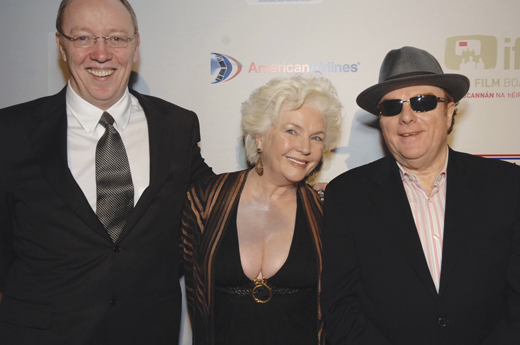
“I have another book called A Disappearance in Damascus,” George adds. “It’s a wonderful book about a Canadian journalist who befriends an Iraqi woman in Damascus, then the woman disappears because of her associations with the journalist. It’s good to have multiple projects on the go. Nowadays you have to have all sorts of coals in the fire for one of them to hit, you know?”
While his work focuses on world conflicts, George’s heart is never far away from Northern Ireland. His film The Shore, about two boyhood friends who meet 25 years after they were torn apart by the Troubles, won the 2012 Oscar for Best Live Action Short Film. It was filmed entirely at George’s family cottage near Ardglass, County Down.
The profound changes that have occurred north and south since he left have astonished him. Now is the time to reach out to unionism with persuasive arguments to make the case for reunification, he says. “They’re not being asked to join some Catholic priest-dominated state anymore. They’re being asked to join one of the most viable sections of the European Union.” It will be hard to get beyond the legacy of sectarianism and bitterness, “but if we can start down that road it will be to the benefit of all,” he says.
Linking each project since the start of his career is a concern for ordinary people making their way and pushing back against often overwhelming odds. That’s the thread he followed out of the Troubles toward his remarkable career. He shows no signs of stopping now. “I’m trying to do a TV series on the Peace process with Niall O’Dowd (publisher of Irish America and the Irish Voice) and Bill Clinton’s involvement and all of that.” ♦ Cahir O’Doherty
_______________
Click below to see Terry George’s remarks at the 2019 Hall of Fame awards luncheon.

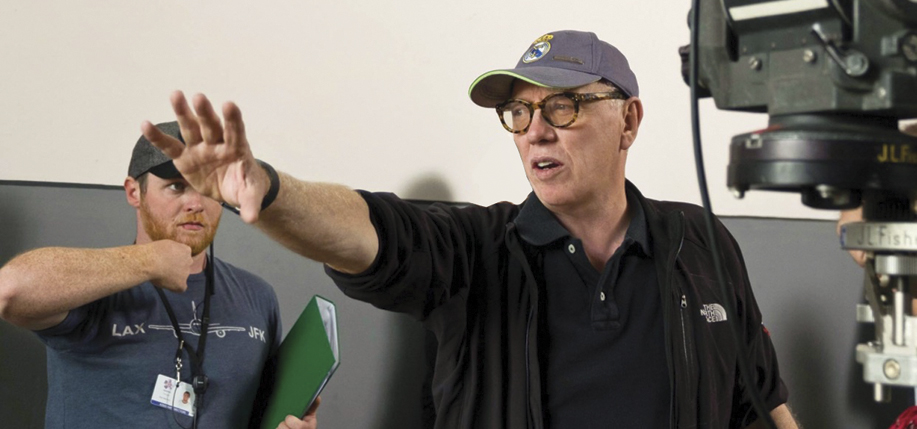
AsI have been so privileged to work with Terry George ,I would like his contact as I want to interview him.
Thank you.
Paddy McCarthy
The Irish Examiner
Publisher/Editorial Director.